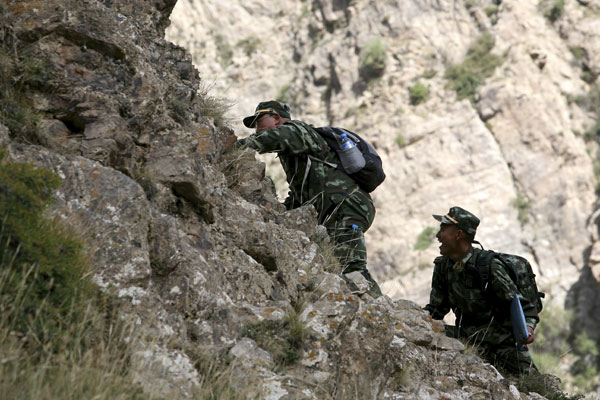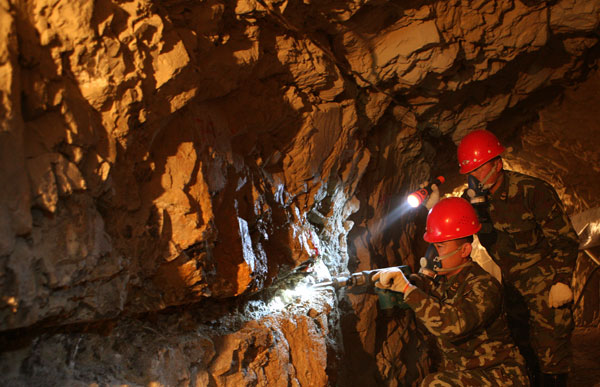Soldiers of fortune target gold deposits
Updated: 2012-08-14 07:43
By Wang Qian (China Daily)
|
|||||||||||
No area is too remote for troops seeking the precious metal
Zhang Zhao has been digging for gold for 13 years in one of the country's most inhospitable areas.
 |
| Soldiers of the Gold Mining Unit survey mountains in the Xinjiang Uygur autonomous region. Lu Guangchen / for China Daily |
 |
|
Officers of the Gold Mining Unit under the Armed Police Force take samples in a gold mine in Gansu province. Lu Guangchen / for China Daily |
He has unearthed a lot of the precious metal but this prospector has not made, nor does he seek, a fortune.
During his career, in the Greater Hinggan Mountains, he has helped discover reserves worth millions of dollars for a monthly salary of about 4,000 yuan ($629).
"It's not about the money," Zhang, a platoon leader for the Gold Mining Unit, said. "It's the pride I get from doing my duty that keeps me going."
Zhang, 32, spends more than 10 months a year collecting rock core samples in the range's virgin forests in Tahe county, Heilongjiang province. He returns to his wife and son, 2, in Hunan province, just once a year, when the extreme cold and snow make it almost impossible to carry out his work.
"Being a member of the Gold Mining Unit means going to the toughest areas and working hard," Zhang said.
The Greater Hinggan Mountains, Northeast China, are just one target area.
More than 10,000 troops survey the nation in search of precious and nonferrous metals, such as copper, lead and zinc.
Between 1979, when the unit was established, and 2010, it discovered 2,269 metric tons of gold, more than one-third of the country's verified reserves, according to the unit. Once the gold is found, mining rights will be transferred to the local or central government.
Li Dong, an analyst for the China Gold Association, estimated that the haul has contributed at least $114 billion to State coffers over the years, taking into consideration the fluctuating market price.
Harsh conditions
Zhang Chun'ge is chief engineer of the unit's No 1 general corps, based in Heilongjiang province and the Inner Mongolia autonomous region. Finding gold and establishing a mine can take a team of about 100 soldiers five years, he said.
First, specialists analyze aerial photos and satellite images to identify areas with potential deposits. The surface is then tested for mineral veins before deeper, exploratory, drilling.
"Generally", chief engineer Zhang said, "the less developed the location, the higher the chance of precious metals being discovered".
For his unit, he said, time is money.
However, this means working conditions are extremely harsh.
Taking a hot bath every week was a luxury for Zhang Zhao's platoon until this year, when electricity was installed in their camp, which is several kilometers from the drilling platform.
It has a volleyball court and movies are shown on Friday. A well and communication tower have been installed.
"The tower can accommodate 20 people calling home at the same time and electricity is on for 24 hours," he said.
All soldiers have to be vaccinated before going into the forests, but even still meningitis and other diseases are a real danger.
Finding gold can take years. A large gold deposit was found recently in the Baoxinggou mining area, in Tahe, by Zhang Zhao's corps. The survey started in 2002. The key to this particular discovery was that about 24 grams of gold were discovered in a 1-ton rock.
Even with gold trading at $16 an ounce (about 30 grams), a mere 24 grams will hardly set the markets alight. But a 1-ton rock, if it has any gold, normally has just 3 grams embedded in it, chief engineer Zhang Chun'ge explained.
This rock indicated that the area had rich deposits.
Recruits for the Gold Mining Unit mainly consist of soldiers from the People's Armed Police Force and university graduates who have studied related subjects.
The gold troop
Established in 1979, the Gold Mining Unit is responsible for establishing and protecting gold mines.
When the People's Republic of China was founded in 1949, the gold industry had an average annual output of less than 10 metric tons.
In 1974, Premier Zhou Enlai asked Vice-Premier Wang Zhen to find ways to boost gold reserves. In 1979 Wang decided to use military expertise.
The Gold Mining Unit was created by reassigning soldiers of the People's Liberation Army.
The unit was given an initial mission to conduct a national survey and produce 150 tons of gold by the end of 1985.
That year saw the unit brought under the command of the People's Armed Police Force and was overseen by the Ministry of Metallurgical Industry (now defunct) and the Ministry of Public Security.
From December, the unit was put under the joint charge of the Ministry of Land and Resources and the People's Armed Police Force.
Besides gold, nonferrous metals such as copper and lead are also included in the unit's mission and their target area is in the Xinjiang Uygur autonomous region, the Tibet autonomous region, Qinghai province and the Greater Hinggan Mountains.
Their work includes geological surveys and disaster relief.
The unit's headquarters are in Beijing.
wangqian@chinadaily.com.cn
Related Stories
Border defense soldiers get care 2012-08-08 07:23
Armed policewomen train with soldiers 2012-08-01 19:06
My good old days with Chinese soldiers 2012-07-31 10:46
Soldiers train amid intense heat 2012-07-24 11:04
Sanatorium helps soldiers deal with stress 2012-06-05 07:38
Today's Top News
President Xi confident in recovery from quake
H7N9 update: 104 cases, 21 deaths
Telecom workers restore links
Coal mine blast kills 18 in Jilin
Intl scholarship puts China on the map
More bird flu patients discharged
Gold loses sheen, but still a safe bet
US 'turns blind eye to human rights'
Hot Topics
Lunar probe , China growth forecasts, Emission rules get tougher, China seen through 'colored lens', International board,
Editor's Picks

|

|

|

|

|

|





